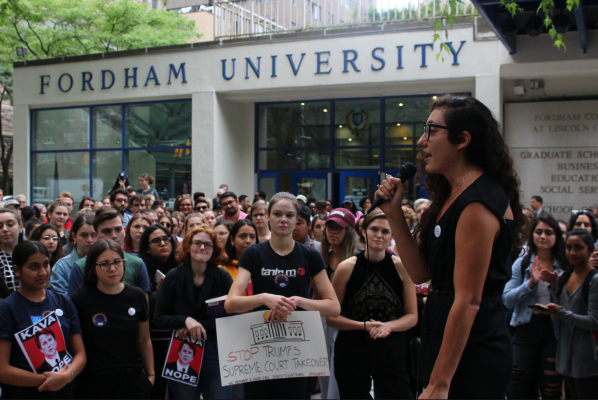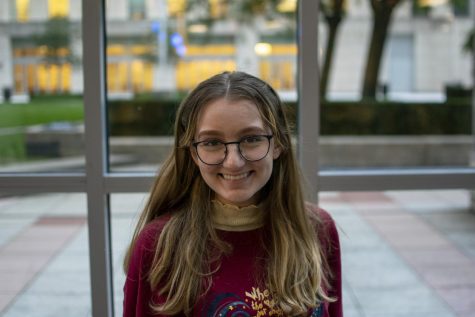Fordham Law and Undergrads Protest Kavanaugh Appointment
October 10, 2018
“Hey hey, ho ho, the patriarchy has got to go!”
Chants and cheers rang through the main entrance of the Lowenstein Building at Fordham Lincoln Center (FLC). There, on Tuesday, Oct. 2, a university-wide walkout demonstration, organized by 14 law students, assembled to the surprise of unsuspecting passersby and students. More than 200 undergraduate and law students, professors and faculty members objected to Judge Brett Kavanaugh’s (at the time) potential confirmation to the U.S. Supreme Court, standing in solidarity with survivors of sexual violence.
Cramped on the entryway terrace and plaza stairwell, protestors stood shoulder to shoulder with #StopKavanaugh signs raised high above their heads. Below, organizers from the law school and undergraduate programs referred to the Sept. 27 public hearings of Kavanaugh and Christine Blasey Ford as but one example of the farther-reaching culture of white male privilege and sexual assault. As many protesters recorded powerful moments of speech for their social media followings, all stood on FCLC grounds to make their voices heard among the whole community.
Opening remarks on Kavanaugh’s past were made by Leena Widdi, a year three law student. “He was credibly accused by three women and had the audacity to make himself the victim and to get upset that he, this man who went to Georgetown Prep and Yale and Yale Law School, was being questioned about his integrity and his qualifications for the Supreme Court,” Widdi said.
The organizers, who call themselves the Fordham Law Coalition of Concerned Students according to their Facebook page, also drafted an open letter to the U.S. Senate. By the time of the vote, 271 law students, faculty, alumni and staff had signed along with 103 students, faculty and alumni from other schools within Fordham University.
Widdi, who spoke as the event’s de facto emcee, explained the walkout’s origins. After spotting a poster reading “Believe Survivors” on the CUNY School of Law campus, she and Jessie Boas, another year three law student, quickly reached out to like-minded peers. “We asked ourselves: ‘Why are we not doing anything at Fordham?’” Widdi said. “This is a legal issue that directly affects members of our community.” Two hours and one conference call later and she and her peers agreed that the most effective protest was a walkout on campus.
A host of mostly female Fordham University School of Law students spoke over the course of an hour to assert communal outrage over Kavanaugh’s alleged past behavior and the insufficient discourse on sexual violence and survival in America. The prevailing theme was the level of hypocrisy in America’s gender politics between men and women.
“I’m particularly encouraged to see all the men that showed up today, thank you for being here,” Year 3 law student Leanne Fornelli said. “Men, we need you as allies. When you see discrimination and you see harassment, we need you to speak up and you know what this looks like.”
This was not the only time speakers emphasized the gendered theatrics in the face of sexual misconduct.
Widdi noted how Dr. Ford was deemed by many to be “the perfect victim,” but the same may not be said for women of color and those from the LGBTQ community. “It’s important that we support women, it’s important that we support Dr. Christine Blasey Ford, that we still support Anita Hill, it’s important that we support our friends, it’s important that we support people in our communities, that we support people we don’t know, who aren’t the perfect witness, who might not be so easy to support,” Widdi said.
Students like Alejandra Garcia Fordham College at Lincoln Center (FCLC) ’21, agreed with these statements, visibly cheering and clapping to display their approval. “Though I wasn’t able to be present for the entire Kavanaugh walkout, the sentiments expressed by the student speakers were extremely powerful and important for the Fordham community to hear,” Garcia said. “The Kavanaugh hearings have clearly exhibited the exorbitant amount of power and privilege assigned to men — particularly white men — in positions of authority.”
Third year law student Ryan Partelow was the only male speaker at the rally and one of two male contributors in the coalition. He highlighted the activism of the community of color in their efforts to change the social narrative of the country.
Partelow also said that just as women of color should be applauded for their dedication to stopping the Kavanaugh campaign, they should not forage ahead alone. “Why is it that we — and I’m specifically talking to all the other white men here — often feel as though we can sit on the sidelines and let women and vulnerable communities lead the fight in these battles without our help?” he asked. “Women and people of color have been shouting from the rooftops these past few weeks about this nominee, and I saw a poll on MSNBC … that only 36 percent of white men in America are currently opposed to the Kavanaugh nomination, and this is after the hearings. It’s shameful, and it’s an indictment of all white men.”
“If you consider yourself a good white man and a good ally who cares about fighting injustice, it’s your responsibility to make sure they’re not alone in this fight,” Partelow continued. “It falls on us to call out rape culture and problematic statements wherever we see them, even if it’s among close friends or family. We don’t have the luxury of sitting on the sidelines anymore … I fight for these issues because women and people of color are human beings, period.”
The diverse student body in attendance did indeed make their mark. In between speeches, Widdi led rallying chants to uplift morale. Attendees yelled that “Fordham Law says no Kavanaugh.” Succinctly put in their own words, “No justice, no peace.” During one speech, the men in the crowd shouted out, “We’ve got your back,” in solidarity with the victims of sexual assault in the crowd.
The University as an institution was quiet regarding the walkout. As the crowd arrived to prepare for the event, a Public Safety officer asked that students move away from the doors so students could enter and exit without issue. Members of Fordham’s faculty and administrators who attended the rally did not respond to requests for comment.
Undergrad speaker Gabriela Ramos-King, FCLC ’20 and vice president of Coalition Against Relationship and Sexual Violence (CARSV), underlined the importance of both believing and supporting survivors. She spoke about the work she does with CARSV, which is the only group on campus granted official club status by the University that specifically fights for justice for sexual assault survivors.
She spoke about accountability, and what voters can do to combat entitled men like Kavanaugh. “We need to tear down the structures of violence and patriarchy and replace them with a culture of consent and equity,” Ramos-King said. “It doesn’t end after a person attends a consent workshop or the abuser is punished. It will take constant work, self-reflection and communication if we want to create a culture free from violence and oppression.”
Speaker Eliza Putnam, FCLC ’18, spoke to a toxic patriarchal culture within the walls of Fordham itself. This past spring, the University charged her and her classmate Sam Norman with dishonesty — a charge on her student record — for attempting to inform classmates about a philosophy professor’s alleged history of misconduct. Though the professor in question was not explicitly named in her speech, she alluded to Professor William Jaworski’s history of Title IX complaints filed against him and his suspension effective this past April.
Putnam did name one former professor in particular: Deal Hudson. Known among conservatives for his Catholic activism, he taught at Fordham from 1989-1994, during which time he allegedly raped and sexually abused an intoxicated 18-year-old freshman student after inviting her out to a bar. The student reported him to both an advisor and then the Dean of Students at Rose Hill, now University President Rev. Joseph M. McShane, S.J.
“McShane appeared sympathetic and she recalled that he gave every indication that he believed her and he was going to try to help her,” Putnam said. “He told her the university would deal with Hudson once the semester concluded; she continued attending Hudson’s classes and was advised not to tell her friends what had happened.”
However, as Putnam explained, Hudson was able to discreetly resign from his tenured position, where he went on to have a fruitful political career and publish a conservative weekly magazine. He also worked as a campaign proxy for President George W. Bush in both election cycles. The student, however, withdrew from the University once her merit scholarship was rescinded for poor grades she received the semester of the incident.
Putnam compared the Kavanaugh controversy to Hudson and the Fordham community. “Fordham failed this student in 1994 like so many students before and since, and the administration also failed our whole community by allowing Hudson to leave here as he did and go on to have the career he did,” Putnam said.
While ruminating on her disciplinary proceedings this past spring in relation to the larger national conversation surrounding Kavanaugh’s past, Putnam said, “We have to reject the complicity and reinforcement of rape culture everywhere we go; that starts right here, that starts with everything we’re doing today by all of us showing [up] and speaking out.”
As the rally wrapped up, students and faculty held one another closely and spoke intimately with one another. Some overheard conversations reiterated the importance of voting, especially for candidates who will act as a voice for those made most vulnerable by the actions of men like Kavanaugh. Fornelli cited the campaigns of women like Alexandria Ocasio-Cortez, Danica Roem and Fordham’s own Professor of Law Zephyr Teachout as key reasons why every vote counts.
Reflecting upon her experience at the walkout, Garcia said, “My hope is that people will actively seek to provide survivors with support and will fight against perpetrators of sexual violence both in our government and in our more immediate communities. They need to be held accountable for their actions, and we need to demand consent education.”













